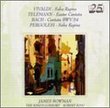| All Artists: Reinhold Gliere, Stephen Gunzenhauser, Slovak Philharmonic Orchestra Title: Glière: Symphony No. 1, Op. 8; The Sirens, Op. 33 Members Wishing: 0 Total Copies: 0 Label: Naxos Release Date: 11/21/1995 Genre: Classical Styles: Forms & Genres, Theatrical, Incidental & Program Music, Historical Periods, Modern, 20th, & 21st Century, Symphonies Number of Discs: 1 SwapaCD Credits: 1 UPC: 730099589826 |
Search - Reinhold Gliere, Stephen Gunzenhauser, Slovak Philharmonic Orchestra :: Glière: Symphony No. 1, Op. 8; The Sirens, Op. 33
 | Reinhold Gliere, Stephen Gunzenhauser, Slovak Philharmonic Orchestra Glière: Symphony No. 1, Op. 8; The Sirens, Op. 33 Genre: Classical
|
Larger Image |
CD DetailsSimilar CDsSimilarly Requested CDs
|
CD ReviewsIlya Mourometz's Little Brother Thomas F. Bertonneau | Oswego, NY United States | 10/28/2000 (4 out of 5 stars) "First symphonies tend to be penned by young men just out of the conservatory and usually show the signs of their derivation. Rachmaninov's Tschaikovskian First Symphony originated as a conservatory exercise; and Glazunov, who led the disastrous premèire of the Rachmaninov, himself delivered a first symphony while still in his teens, owing a debt to Borodin and Balakirev. Reinhold Glière's (1875-1956) First Symphony in E-Flat Major (1899-1900) indeed began life while its composer still counted himself a student at the Kiev Conservatory, where he studied with Ippolitov-Ivanov. As in the case of Rachmaninov, Tschiakovsky figures as the major influence, although contrary to what the notes to this Naxos CD say, the Russian nationalists also make their presence felt in Glière's abundance of Slavic melodies. The First definitely foreshadows the great Third Symphony, "Ilya Mourometz," in its mining of Slavic lore: The opening Andante of the First Movement, for example, sounds like it might be derived from Znammeny Chant; the ensuing Allegro is lively and heroic - you can picture the Bogatyrs riding across the steppe. (The key, E-Flat, is the typically heroic key, as in Beethoven's "Eroica" or Strauss's "Ein Heldenleben.") The succeeding three movements are all about half the length of the fourteen-minute First Movement. Glière gives us a Balakirevesque scherzo, a song-like Andante, which returns in mood to the opening of the First Movement, and a final Allegro, once again Balakirevesque. Stephen Gunzenhauser and the Slovak Philharmonic play the symphony for all that it is worth, which is plenty. The later tone-poem "The Sirens" (1908) is less memorable than the symphony. This program came out originally on a Marco Polo LP, then reappeared as a Marco Polo CD. The Naxos reincarnation makes sense. Cognoescenti of "Ilya Mourometz" will want to know its two "little brothers" among Glière's symphonies. Start with this one." Pleasant, but nothing extraordinary Slovakophile | 03/07/2007 (3 out of 5 stars) "The first of Gliere's three symphonies is pleasant but not very memorable. Like most early works of other composers, Gliere's Symphony No. 1 shows the influence of his predecessors/mentors (in this case Tchaikovsky and Ippolitov-Ivanov). Nevertheless. listening to Symphony No. 1 can provide an interesting contrast to the monumental Symphony No. 3 ("Il'ya Murometz"). The intriguing symphonic poem "The Sirens" is a bit of a "make-weight" on this CD (the CD's total time is just less than 50 minutes) that evokes the sea and the allure of the sirens who are beneath the waves.
The Slovak Philharmonic Orchestra and Stephen Gunzenhauser give these pieces a good go and hardly diminish the qualities of the music." |

 Track Listings (5) - Disc #1
Track Listings (5) - Disc #1












